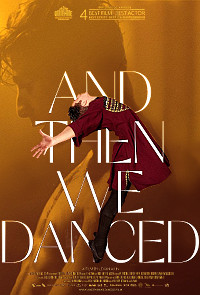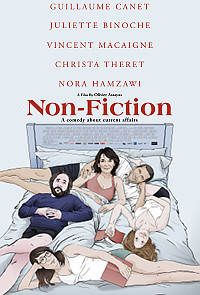| SHADOWS ON THE WALL | REVIEWS | NEWS | FESTIVAL | AWARDS | Q&A | ABOUT | TALKBACK | |||||||||||||||||||||||||||||
 Shadows off the beaten path Shadows off the beaten pathIndies, foreigns, docs, revivals and shorts...
On this page:
AND THEN WE DANCED |
MATTHIAS & MAXIME |
NON-FICTION
| |||||||||||||||||||||||||||||
| See also: SHADOWS FILM FESTIVAL | Last update 15.Oct.19 | |||||||||||||||||||||||||||||
|
And Then We Danced Review by Rich Cline | 
CANNES FILM FEST  
| 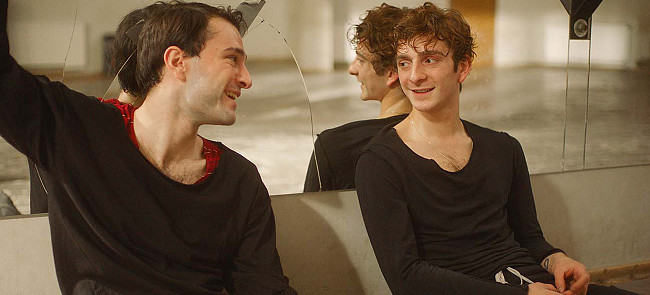 There's a lovely mix of personal emotion and societal outrage in this sensitive Georgian coming-of-age drama. Swedish writer-director Levan Akin keeps the camera close to the protagonist, seeing events tightly through his eyes as the world comes into brighter focus for him. What it says about empty, fearful machismo is very harsh, and this is also an engaging celebration of artistic freedom. And a bold statement of support for Georgia's LGBTQ community. In Tbilisi, 20-ish Maleb (Gelbakhiani) is in the national dance ensemble's junior company, and dreams of joining the lead group. He and Mary (Javakishvili) have been dance partners since age 10, so it seems natural that they're a couple. Maleb lives with his mother and grandmother (Bukhnikashvili and Gogichaishvili), and his dancer brother David (Tsereteli), a golden boy who's actually a mess. Then the charismatic Irakli (Valishvili) joins the company, training with Maleb to audition for a top spot. And when their friendship boils over into mutual attraction, they're afraid to let anyone find out. There's gossip going around the company about another dancer who was outed and ended up on the streets as a result. So Maleb and Irakli know the stakes here. Even the traditional dances have been butched-up to eliminate questions about the dancers' masculinity. In this religious society, any infraction is cause for punishment, so David's petty criminality is clearly going to bring trouble to the family. And as he feels increasingly isolated in his life, Maleb struggles with where to turn for a friend. Performances are earthy and realistic across the board, making the movie feel almost like a documentary, especially in dance rehearsal rooms where the actors demonstrate their physical skills. In every scene, young Gelbakhiani adds a sense of curiosity and energy in his interaction with everyone around him and also in a range of dancing styles, from traditional to street to nightclub. Valishvili is a scene stealer as Irakli, and stirs in some intriguing subtext too. But then each character feels bracingly full of complex life. Filmmaker Akin tells this story with a punchy sense of authenticity, both in the lively rehearsal rooms and on spirited nights out, plus a particularly fraught weekend in the country. Each scene works together to build a strong picture of a society in which male and female roles are strongly proscribed, and any variance is unacceptable. So watching Maleb fight against himself is hugely involving on a variety of layers.
|
| Matthias & Maxime Review by Rich Cline | 
| 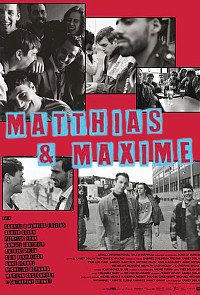 dir-scr Xavier Dolan prd Xavier Dolan, Nancy Grant with Gabriel D'Almeida Freitas, Xavier Dolan, Anne Dorval, Antoine Pilon, Pier-Luc Funk, Samuel Gauthier, Marilyn Castonguay, Harris Dickinson, Adib Alkhalidey, Micheline Bernard, Catherine Brunet, Alexandre Bourgeois release Can 9.Oct.19, UK Oct.19 lff 19/Canada 1h59 CANNES FILM FEST 
| 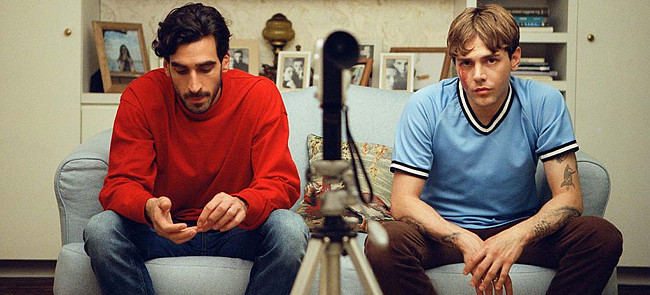 There's a bold, bracingly fresh idea at the centre of this film, and actor-filmmaker Xavier Dolan spends much of the running time avoiding it, just as his characters do. The film is sharply written to catch the rhythms of 30-somethings still working out where to go with their lives. And the central story of two lifelong friends has a strong kick, even if it comes a bit late. Best pals since childhood, Matt and Max (Freitas and Dolan) have a lovely gang of friends and family around them in Montreal. When an art student asks them to kiss in her film project, they barely hesitate. But this sparks an internal journey for Matt, as he grapples with his feelings for Max. Unable to understand Matt's sudden silence, Max gets on with caring for his cruel mother (Dorval) and preparing to move to Australia. And as his leaving do approaches, Matt becomes increasingly nervous, and his girlfriend Sarah (Castonguay) clearly understands what's going on. There are a lot of characters and side-stories along the way, including Matt's feeling that he's stuck in a career he never wanted, especially as he has to host louche, overly heterosexual client McAfee (Dickinson) from Toronto. And yet Matt is too paralysed to say anything, mumbling platitudes at parties and picking fights with old friends. Clearly, as McAfee notes, humans are animals straining against the structures of polite society. Dolan has electric screen presence as the optimistic, misunderstood Max. With his facial birthmark he's understandably suspicious of strangers, so the collapse of his friendship with Matt leaves him lost. But this is revealed in subtext, as Freitas also stares into the middle-distance while Matt grapples with what he knows he should do. His performance is harder to read, so it feels that Matt is wallowing. Of the supporting cast, Dorval is of course magnificently complex, and Dickinson brings intriguing layers to McAfee. He also gets to speak the film's thesis, which gurgles subliminally through all of the other scenes. In fact, it's easy to miss. The idea that sexuality is an aspect of nature at odds with culture is a powerful one, and Dolan might have explored this more evocatively if he had started at the midpoint of this narrative and continued on further. Because as is, the film is vivid and edgy, packed with beautifully played moments and some real emotion. But it ends just when it begins to get properly powerful.
|
| Non-Fiction Doubles Vies Review by Rich Cline | 
VENICE FILM FEST TORONTO FILM FEST 
| 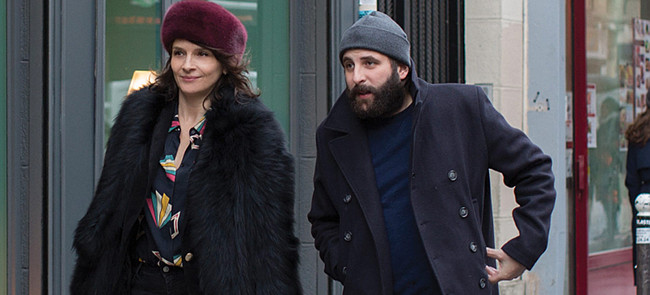 French filmmaker Olivier Assayas takes a breezy look at the intersection between people and the arts in this chatty ensemble comedy. It's packed with people who are grappling with middle-age issues relating to their careers and relationships in the context of how the world is changing around them. Without a central plot, the film swirls around conversations between five main characters whose lives are engagingly intertwined. In Paris, publisher Alain (Canet) is trying to get a grip on the emergence of e-books. He has just rejected the latest novel by author Leonard (Macaigne), but since Leonard is having an affair with Alain's wife Selena (Binoche), he gets her to put in a word for him. And Alain is sleeping with his new-media assistant Laure (Theret). Meanwhile, Selena is struggling with her career as a TV cop, dreading the fourth season of her series. And Leonard's wife Valerie (Hamzawi) is stressed out in her job working for a notorious politician (Bouchaud). The running joke is that Leonard's novels are thinly veiled stories about his friends, and these sparky references liven up the otherwise rather dense and rather relentless discussions of politics and culture. There's a lot of talk about social media and new outlets for art on electronic devices, plus the impact of these things on traditional books, movies and museums. The dialog is nonstop (it's a lot of subtitle reading for non-French speakers), but it's natural and relaxed and full of witty observations. Each actor brings a casual realism to his or her role, which makes the messy interconnections entertaining. Canet plays Alain as a man fully aware of every secret those near to him are keeping from him, but he won't admit that he knows, so he drops hints in his words and actions. Binoche gives Selena a terrific vitality, even as she feels like her life has become stuck in a direction she can't change. And Macaigne has a wonderful hangdog charm, hapless and needy but always likeable. Refreshingly, Assayas doesn't have a point to make, other than the idea that even as the world changes people remain the same as always. So for all of the conversation about tradition and progress, not throwing out the things that work and adapting to new realities, the film really seems to be saying that shifts in culture are impossible to define. They're a lot of fun to talk about, but talking gets us nowhere. And relationships remain the defining aspect of humanity.
| 
See also: SHADOWS FILM FESTIVAL © 2019 by Rich Cline, Shadows
on the Wall
HOME | REVIEWS | NEWS | FESTIVAL | AWARDS
| Q&A | ABOUT | TALKBACK | | |||||||||||||||||||
